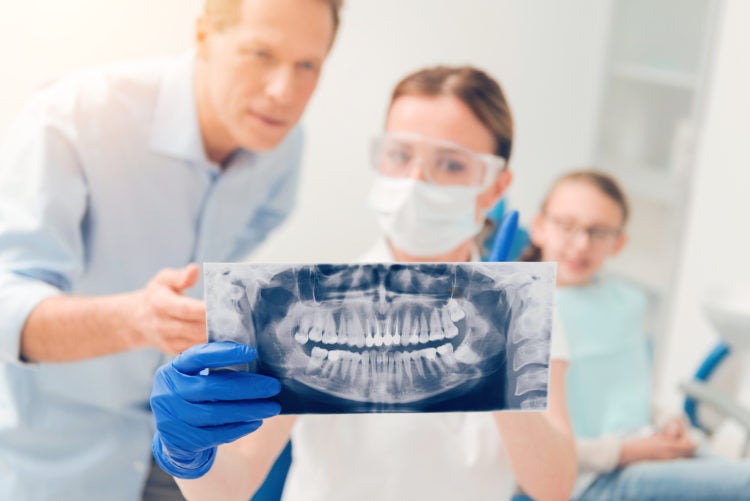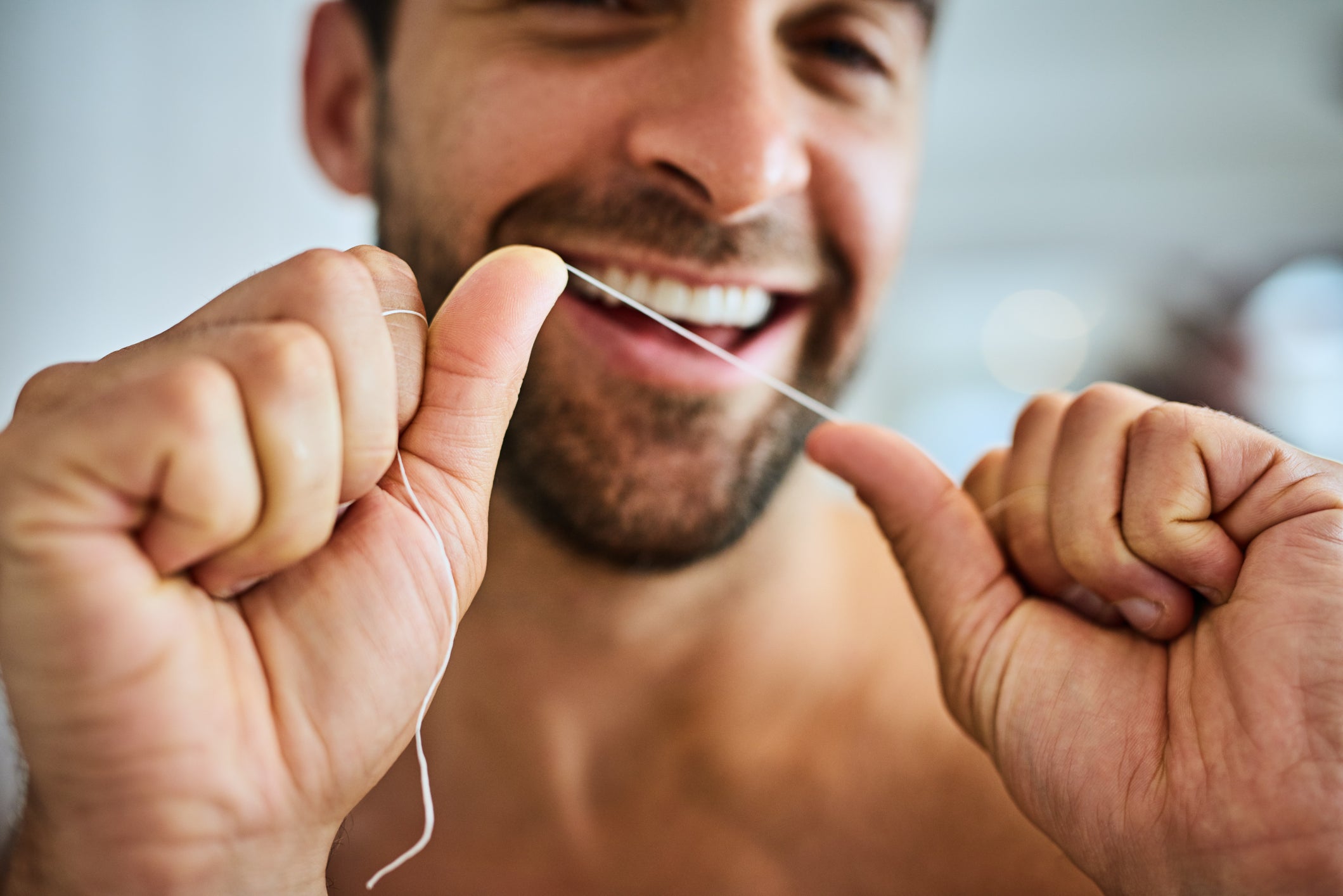-
Wisdom Teeth: What You Need to Know

They say that with age comes wisdom. They may not say this as often, but with age also comes wisdom teeth. This is the last big developmental milestone your mouth undergoes as childhood comes to an end.
Wisdom teeth usually appear between ages 17 and 21. They are your third row of molars evolutionarily designed to replace any teeth you may have lost by now. Thankfully, because of modern dentistry and oral hygiene, you probably still have all of your adult teeth at this age. As a result, there may be no room to allow your wisdom teeth to grow in naturally.
If you’re in your late teens or early 20s, here’s what you need to know about wisdom teeth to help you make the right choice for your oral health.
Why are Wisdom Teeth So Often Removed?
When they grow in properly, healthy wisdom teeth can be beneficial, helping you chew and filling in your jaw with a final row of teeth. However, if the jaw is too small, or the wisdom teeth don’t grow in straight, they may need to be removed. Scenarios like these are incredibly common, meaning that more likely than not, you will need to have your wisdom teeth extracted.
Here are some of the problems your dentist looks for as he or she monitors the growth of your wisdom teeth:
- Impacted wisdom teeth, which are trapped in the jaw or under the gums and can cause a harmful cyst to develop
- Improperly positioned wisdom teeth, which can allow food to become trapped and flossing to be difficult
- Partially erupted wisdom teeth, which give bacteria a place to enter the gums and cause an infection to develop
- No room for wisdom teeth to come through without overcrowding or damaging the surrounding teeth
When to Have Your Wisdom Teeth Removed
Everyone is unique, but your dentist may recommend extracting your third molars in these situations:
- As a preventative measure if your mouth appears too small
- As part of your oral health plan, such as before getting braces
- If X-rays reveal impacted wisdom teeth
- If you experience pain, cysts, tumors, damaged teeth, or gum disease
Is it Possible to Keep Your Wisdom Teeth?
If it’s not immediately necessary to remove your third molars, you may choose to let them continue developing. Your dentist will recommend monitoring them regularly because of the possible problems that can occur later. Be sure to floss around your wisdom teeth, including behind them, and visit your dentist at least every six months.
Park 56 Dental offers compassionate, high-quality dentistry in NYC. We know you might be anxious about having your wisdom teeth extracted. That’s why we make sedation dentistry available to our patients. We’ll work closely with you to determine whether nitrous oxide (laughing gas), oral sedation, or IV sedation is the best option.
Please contact us today at (212) 826-2322 to schedule a wisdom tooth extraction consultation at our New York office.
-
Why Flossing is Important to Your Dental Health

While seven out of 10 Americans brush their teeth at least twice a day—the amount recommended by the American Dental Association—only 30 percent of the population flosses every day. This makes it clear that people prioritize brushing, but they’re more inclined to write off flossing. Here’s why you shouldn’t skip this important part of your oral care routine.
Flossing Removes Plaque
Plaque is a soft, sticky substance that forms on your teeth after you eat. Within just a few hours, it starts to solidify into tartar, a hard substance that forms along the gum line. Skipping a few days of flossing gives plaque all the time it needs to stick firmly to your teeth. By then, the dark-colored tartar can only be removed by a dentist using special tooth-scraping tools.
Thanks to floss, you can get into hard-to-reach places between the teeth and under the gum line, scraping away plaque before it hardens into cavity-causing, tooth-staining tartar!
Flossing Promotes Healthy Gums
Perhaps you intentionally avoid flossing because it makes your gums bleed. It may seem counterintuitive, but flossing actually strengthens your gums to reduce bleeding.
Scraping plaque out from below the gum line also helps prevent gingivitis, an infection characterized by red, swollen gums. Gingivitis is the first stage of gum disease, or periodontal disease, which can lead to tooth loss if it’s left untreated for long enough.
Flossing Makes Your Whole Body Healthier
Cavities and gum disease affect other parts of your body more than you might realize. The bacteria that thrive in an unhealthy mouth can lead to heart disease, respiratory illness, and diabetes. It could even increase your risk of having a stroke.
Therefore, just a few minutes of flossing each day with a low-cost product could have incredibly beneficial implications for your overall health.
Flossing Fights Cavities
A cavity can develop anywhere tooth decay occurs, including in between two teeth and under the gum line. Prevent bacteria from building up here with the simple act of flossing. It could save you the discomfort and cost of a root canal!
Proper Flossing Technique
If you use traditional floss, wrap the ends of an 18-inch piece around your forefingers, and gently slide it between each tooth. Curve around one tooth, and then the other, rubbing up and down to scrape away floss and stimulate the gums. Avoid a sawing motion, which can harm your gums. If traditional floss is uncomfortable, you can also use floss picks or a water flosser.
Clearly, flossing is a simple step you can take to keep your mouth healthier. Of course, it can’t replace professional dental cleanings, which should take place every six months or as recommended by your dentist. Park 56 Dental is here to help you take good care of your smile. We provide general dentistry as well as smile restoration services. Visit us for the dental care you need today!
For more dental health tips, or to schedule an appointment, please contact us at (212) 826-2322.
-
Summer Dental Care Tips

You might have a carefree attitude this summer, but don’t let the family vacations and time off of school negatively impact your teeth. Instead, keep your smile beautiful with these summer dental care tips.
Drink More Water
Instead of reaching for sugary, acidic soda when you’re thirsty, make the right choice for your dental health and choose water instead. Drinking water washes away food particles and plaque-causing bacteria that can lead to cavities and bad breath. Tap water, in particular, promotes a brighter smile because it contains fluoride to strengthen your enamel.
Plus, staying hydrated reduces your risk of dry mouth. With adequate saliva production, your teeth benefit from a slippery, protective coating that prevents debris from clinging and acids from eating away at your enamel.
Drink Acidic Beverages Through a Straw
When you do indulge in soda, juice, or lemonade, use a straw to reduce contact with your teeth. Enjoy the taste of your drink, but don’t swirl it around your mouth. After all, you want to limit the amount of time acid and sugar linger on your teeth.
Sip on Tea
Green tea is full of antioxidants that promote good health. It can even suppress bacteria growth, slow down tooth decay, and help prevent gum disease. Drink tea to your heart’s content, but don’t forget to rinse your mouth out afterward. This is because, despite its benefits, tea can leave surface stains on your teeth. Your dentist can remove these, but it’s easiest to prevent them if you can by swishing with water after each cup of tea.
Eat the Right Snacks
It’s fun to chew on gummy candy, sip on sports drinks, and snack on starchy crackers and pretzels, but these goodies don’t do your teeth any favors. Smarter snacks include raw fruits and vegetables, low-fat dairy products, and crunchy nuts and seeds. These tasty, nutritious snacks fill you up, fuel your summer activities, and help you maintain a healthy smile. Chewing on sugar-free gum after a meal or snack can also help remove food particles and prevent cavities.
Schedule a Dental Checkup
If it’s been six months since your last trip to the dentist, this summer is the perfect time to schedule a checkup. Fit it your appointment before your upcoming vacation, if possible, to reduce the chance of a dental emergency while you’re out of town. A dentist appointment is also beneficial before the school year starts this fall. Get any cavities taken care of before the hectic back-to-school season begins!
The experienced NYC dentists at Park 56 Dental are prepared to offer personalized, quality dental care for you and your kids in a comfortable, spa-like environment. We’ll help you smile bigger and brighter this summer as you enjoy making memories with your family!
To learn more about us, or to schedule a visit, please contact us at (212) 826-2322. If you’re new to our office, we’ll provide a consultation to ensure we can meet your dental care needs.
-
Reasons for Teeth Sensitivity

Does an ice-cold drink or cup of hot coffee sometimes make your teeth sting? Are brushing and flossing cringe-worthy experiences? If so, it sounds like you might have sensitive teeth. Here are some possible reasons for teeth sensitivity and what you can do about it.
What Causes Sensitive Teeth?
In healthy teeth, enamel protects the crown of your tooth, the part that sits above the gum line. Then, a layer called cementum protects the tooth root below the gum line. If these protective layers are damaged, teeth sensitivity can occur. Here are some of the most common causes to be aware of:
- Enamel erosion: If the outer protective layer of your teeth wears away, the sensitive dentin underneath is exposed. Enamel can erode as a result of brushing too hard, grinding your teeth, and eating acidic food regularly.
- Receding gums: When the gums move away from a tooth, it can expose the root surface, which may be temperature-sensitive. Receding gums may be caused by brushing too hard, grinding your teeth, or receiving inadequate dental care that leads to gum disease.
- Plaque buildup: If plaque forms on an exposed root surface, tooth sensitivity may increase.
- Cracked teeth: A chipped or broken tooth may fill with bacteria. When this enters the pulp, inflammation and tooth sensitivity may occur.
- Tooth whitening products: Peroxide and baking soda, two major contributors to teeth sensitivity, are common ingredients in whitening strips, toothpaste, and other dental products.
- Using a mouthwash with exposed dentin: Some over-the-counter mouthwashes contain acids that irritate exposed dentin and further damage this tooth layer. If you have enamel erosion, ask your dentist about safe products you can use.
- Recent dental procedures: Everything from teeth cleanings to crown placement to root planing and scaling can lead to temporary teeth sensitivity. This should disappear within four to six weeks.
How to Treat Teeth Sensitivity
Fortunately, there are treatments for sensitive teeth. The ones you pursue depend on what’s causing your sensitivity. Your dentist may recommend the following:
- Desensitizing toothpaste: The compounds in this product block sensory input from the tooth surface to the nerve in your tooth, reducing sensitivity. It may take a few weeks of daily use to see results.
- Soft-bristled toothbrush: Learning how to brush more gently using a soft toothbrush, especially when paired with desensitizing toothpaste, could garner effective results.
- Fluoride treatment: An in-office gel applied to your teeth may strengthen your enamel and reduce pain when exposed to hot and cold temperatures.
- Dental procedures: If simple measures don’t treat your sensitivity, your dentist may recommend surgical gum grafting, bonding, dentin sealers, crowns, inlays, or root canals to eliminate the problem.
Having sensitive teeth can be uncomfortable. Fortunately, the team at Park 56 Dental can help! Our preventative and general dentistry services can counteract teeth sensitivity so you can enjoy hot and cold food and drinks, and brush your teeth in comfort. To learn more, please call us at (212) 826-2322 today.
RECENT POSTS
categories
- Uncategorized
- Cosmetic Dentistry
- Veneers
- Healthier Teeth
- Teeth Whitening
- Dental Health
- Video
- Dental Emergencies
- Invisalign
- Dental Implants
- Root Canal
- Sedation Dentistry
- Infographic
- Dental Crowns and Bridges
- Dental Anxiety
- Gum Disease
- COVID-19
- Bad Breath
- New York Dentist
- Cut out sugar
- General Dentistry
- Oral Health
- Oral Cancer
- Dry Mouth
- Gum Health
- Toothache
- Dental Sealants
- Cavities



